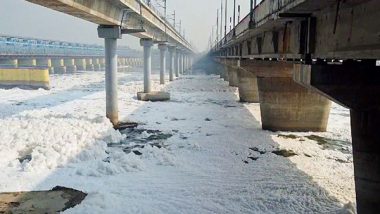
New Delhi [India], October 20 (ANI): Experts have raised concerns over the toxic white froth in the Yamuna River, stating that it contains harmful organic matter which releases volatile gases directly into the atmosphere. Speaking to ANI, Professor Sachchida Nand Tripathi, Dean of the Kotak School of Sustainability at the Indian Institute of Technology, Kanpur, said, "The effect of froth on the Yamuna River is dangerous. The frequent occurrence of froth is primarily due to the large amounts of surfactants from soap, detergents, and other pollutants in untreated wastewater flowing into the river.
" Also Read | Rajasthan Bulldozer Action: 'Illegal' House of 2 Accused in Stabbing Incident at Jaipur Temple Demolished. "After the monsoon, the stable atmosphere and rising temperatures create ideal conditions for froth formation. Later, in October, when temperatures drop, it helps stabilise the froth.
However, this froth contains harmful organic matter that releases volatile gases directly into the atmosphere. The partitioning of froth also releases volatile organic gases and semi-volatile organic compounds. These organic gases become precursors to secondary organic particulate matter," he added.
He further stated that the froth also makes the water unhealthy for aquatic life. Also Read | Pune Jeweller Threatened With Email Demanding 'Crores of Rupees', Sender Claims To Be Lawrence Bishnoi Gang Member. "Froth can kill healthy algae, and fish, and other aquatic organisms can die because of it.
It also leads to a reduction in dissolved oxygen (DO), which makes the water unhealthy for aquatic life. All in all, it's detrimental to the environment," he told ANI. Professor Tripathi suggested that the government should increase wastewater treatment capacity, prevent untreated waste from flowing into the Yamuna, and regulate industrial waste disposal to tackle the problem of toxic white foam in the river.
"To combat the problem of froth in the Yamuna, the government needs to increase its wastewater treatment capacity. Secondly, efforts should be made to ensure that no untreated waste enters the river. If any activity is taking place along the banks, awareness must be raised.
Thirdly, there is a need to regulate industrial waste disposal through the use of technology," he told ANI. An analysis of the Yamuna's water quality, published by Sharma, showed that organic pollution, particularly from industrial and agricultural runoff, plays a significant role in the frothing problem by promoting microbial degradation and gas production. Research indicates that organic compounds in polluted water can undergo phase partitioning between water and air, potentially forming secondary organic aerosols (SOAs) when volatile organic compounds (VOCs) react with atmospheric oxidants.
This partitioning is influenced by factors such as temperature, humidity, and the composition of organic matter in the water. In conditions with high levels of pollutants and surfactants, as seen in the Yamuna River, the potential for organic material to transfer into the air increases. Studies have shown that the presence of water content and organic species in the liquid phase can enhance SOA formation by increasing the partitioning of volatile organic compounds into the air.
This process is especially significant in urban areas with heavy pollution, similar to the conditions in the Yamuna River. (ANI) (This is an unedited and auto-generated story from Syndicated News feed, LatestLY Staff may not have modified or edited the content body).










